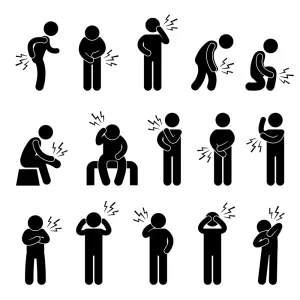Fibromyalgia- fact or fiction?
- There used to be a lot of debate and denial about Fibromyalgia- but now there’s wide agreement that it’s a very real syndrome.
- Fibromyalgia is common, affecting around 2% of people, and it can make life pretty miserable.
- The truth is that doctors may feel uneasy dealing with it for a few reasons- there’s no simple test for it, symptoms of Fibromyalgia vary from person to person, and there’s no one-size-fits-all way of treating it.
- Sometimes this means that getting a diagnosis of Fibromyalgia takes longer than it should- in some cases involving several frustrating years of going back and forth to GPs and specialists.
- However, prompt recognition of the symptoms of Fibromyalgia, and an early diagnosis is important, as it lets people take the steps they need to manage it, and avoid repeated and unnecessary investigations.
Symptoms of Fibromyalgia
If you have symptoms of Fibromyalgia, your GP will often be to diagnose it without any need for you to see a specialist. Though symptoms may come and go, you may be experiencing some or all of the following from time to time:
- Widespread aches and pains for over 3 months- this pain often has a burning quality, and is not limited to any specific part of the body- it can move around. In the past, doctors used to check for certain “tender points” on the body- but it’s now known that this is not a very accurate way of diagnosing Fibromyalgia.
- Fatigue and sleep disturbances
- Trouble with thinking, concentration and memory
- Changes in mood
- Various other physical symptoms of Fibromyalgia include headaches, restless legs syndrome, dizziness, feeling too hot or cold, irritable bowel syndrome or numbness and tingling in the arms and legs.
It’s still not understood what leads to these symptoms.
What else could it be?
- This depends on your symptoms.
- Fibromyalgia can mimic many different conditions. Depending on the type of symptoms you have, your doctor will ask certain questions and may recommend tests to rule out issues such as an underactive thyroid, depression, anxiety, M.S, or inflammatory conditions like lupus or rheumatoid arthritis.
- Of course, it’s possible to have more than one thing going on- for example, some people may have an underactive thyroid AND symptoms of Fibromyalgia, or be suffering from depression too.
Do I need tests for Fibromyalgia?
- The tests you need will depend on what symptoms you have- and may include a blood count, liver and kidney function tests, thyroid function tests, calcium levels, B12, folate, Vitamin D levels and other tests to check for inflammatory conditions such as rheumatoid arthritis and lupus.
- If you have prominent bowel related symptoms, a colonoscopy may be recommended.
- If you have a lot of nerve related symptoms such as pins and needles or numbness, you may need scans or a neurology opinion.
- But in most cases, the history itself will suggest the diagnosis of Fibromyalgia, and blood tests are just done to ensure there’s nothing else going on.
- It’s often useful to see a specialist- a rheumatologist can help to rule out other underlying causes of the symptoms
Treatment for Fibromyalgia
Treatment for Fibromyalgia may vary depending on the predominant symptoms- management needs to be individualised for each person.
- It’s very helpful if Fibromyalgia is diagnosed early, and the patient is given the information they need to deal with it.
- For pain management, standard painkillers tend not to work very well for symptoms of Fibromyalgia. If pain is bad, certain painkillers and antidepressant type medication may be beneficial for some people- but it is important that painkillers should not be continued if they are not having an effect.
- If low mood, anxiety or difficulty coping are prominent symptoms, seeing a psychologist for CBT (cognitive behavioural therapy) may help. Occasionally antidepressant medication may be useful too.
- Other medications can help if sleep problems are a significant issue- some nerve pain medications may offer benefit in terms of pain and sleep.
- Often a gradual increase in physical activity and fitness can be helpful- you may need some guidance from an exercise physiologist or personal trainer. It may require patience to see improvement- taking it at a pace that gives benefit without triggering pain.
- It’s a good idea to team up with your doctor to discuss treatment for Fibromyalgia, and create a tailor-made combination of the above options, based on your symptoms, personal circumstances and lifestyle.
- Referral to a specialist, such as a rheumatologist or pain specialist may also be recommended.
If you have more questions about the symptoms of Fibromyalgia, speak to your GP.
Getting a Mental Health Care Plan in Australia: Your Guide
Getting a Mental Health Care Plan in Australia: Your Guide Mental health matters—and if you’re feeling overwhelmed, anxious, or down, a mental health care plan can help. But what is it, and how do [...]
UTI Symptoms and Treatment: What You Need to Know
UTI Symptoms and Treatment: What You Need to Know Urinary Tract Infections (UTIs) are common, uncomfortable, and often disruptive. But what exactly are the signs to watch for, and how can you get relief [...]
Free Mental Health Care Plan Online | Bulk-Billed by Qoctor
Free Mental Health Care Plan Online | Bulk-Billed by Qoctor Discover how to get a free, bulk-billed Mental Health Care Plan (MHCP) in Australia through Qoctor's telehealth service. Accessing [...]






